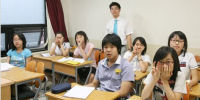Teaching In South Korea: Frequently Asked Questions
So what does teaching in South Korea actually entail? The educational system in Korea is somewhat different from that found in the UK, so here is a brief summary. Remember if you have any questions regarding this, you can contact us using the details on our contact page. Also remember that prior to
acceptance of a contract, comprehensive information on the position will be disclosed so that you will know exactly what kind of job you are applying for.
Where will I teach?
 Korea operates a system of private schools called 'Hagwons' (meaning 'Academies'). Korean parents take education seriously and many children attend these private schools in the afternoon and evening after their regular schooling has finished. As the city with the highest average wage in South Korea, Ulsan has many academies serving a variety of academic subjects, located throughout the city and its suburbs.
Korea operates a system of private schools called 'Hagwons' (meaning 'Academies'). Korean parents take education seriously and many children attend these private schools in the afternoon and evening after their regular schooling has finished. As the city with the highest average wage in South Korea, Ulsan has many academies serving a variety of academic subjects, located throughout the city and its suburbs.
Who will I be teaching?
 The age of students will generally range from 4 or 5 up to 18. The majority of academies will focus upon 'Elementary' or 'Middle School' students, who are between 7 and 16 years old, although some operate Kindergartens or even adult conversation classes. Each class will have no more than 12 students
The age of students will generally range from 4 or 5 up to 18. The majority of academies will focus upon 'Elementary' or 'Middle School' students, who are between 7 and 16 years old, although some operate Kindergartens or even adult conversation classes. Each class will have no more than 12 students
although many will be smaller.
What will be expected of me?
 The Academy will provide you with all of the teaching materials you will need and will typically set out exactly how they would like the curriculum to be taught. The Korean teachers in the academy will generally teach the structural elements of English, such as grammar, leaving the native English speaking teachers to practice reading, speaking and listening. The exact modus operandi will vary between schools but usually the teaching structure is well organised while leaving some room for individual initiative.
The Academy will provide you with all of the teaching materials you will need and will typically set out exactly how they would like the curriculum to be taught. The Korean teachers in the academy will generally teach the structural elements of English, such as grammar, leaving the native English speaking teachers to practice reading, speaking and listening. The exact modus operandi will vary between schools but usually the teaching structure is well organised while leaving some room for individual initiative.
What hours/days will I work?
Typically you will work 5 days a week (Monday to Friday), and no more than 7 hours a day. Not all of this time will be spent teaching, and you may be expected to prepare classes depending on the school's curriculum. Most academies open in the afternoon after the public schools have closed. Common
opening hours might be between 2pm or 3pm and 9pm. Whilst this might seem a little unsociable, bear in mind that South Korea generally operates far longer opening hours than the UK and so it's quite possible to go food or shoe shopping, or even go to the gym, in the evening after your shift has finished!
Is teaching for you?
 It may be that you come to Korea having already had experience of teaching. If this is the case, then you already know the satisfaction that comes with being involved with the development and progression of children's education. Small class sizes will allow you to get to know many of the students well, and you will find they are fascinated towards you as a foreigner and generally very attentive in class. The student's enthusiasm is deeply endearing and you will find yourself enjoying teaching in no time at all.
It may be that you come to Korea having already had experience of teaching. If this is the case, then you already know the satisfaction that comes with being involved with the development and progression of children's education. Small class sizes will allow you to get to know many of the students well, and you will find they are fascinated towards you as a foreigner and generally very attentive in class. The student's enthusiasm is deeply endearing and you will find yourself enjoying teaching in no time at all.
 Korean schools have much higher levels of discipline than their Western counterparts, and so the common misgiving towards teaching (i.e. misbehaviour in the classroom) is not such an issue in South Korea. In some schools, if you teach a larger class you may be provided with a native Korean assistant,
Korean schools have much higher levels of discipline than their Western counterparts, and so the common misgiving towards teaching (i.e. misbehaviour in the classroom) is not such an issue in South Korea. In some schools, if you teach a larger class you may be provided with a native Korean assistant,
who will handle matters of disciplining the students. Koreans hold education in very high regard and teaching is a respected role within society. The children will generally view education as a boon, rather than something that must be endured, and you will find them very responsive to your efforts. All in all, most teachers who leave Korea have predominantly positive stories to tell of the experience. You will learn many new skills and your time spent in Korea can feature prominently on your resume whether you subsequently decide to pursue a career in teaching or not.












